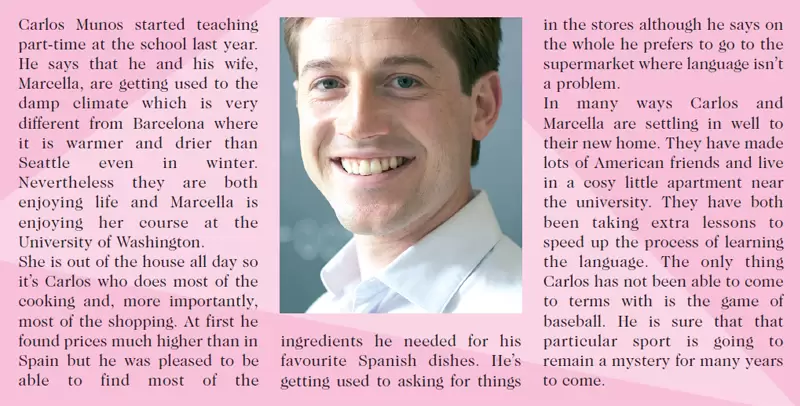Nesta lição, continuamos a aprender sobre estar inserido em novas culturas, ao expandir o conhecimento até as collocations!
1 . Qual a sensação de estar em um lugar desconhecido, estressante ou emocionante? Da última vez que esteve fora do país, a que você achou mais fácil ou difícil de se adaptar? Escolha um título para cada foto.
the weather | the food | the lifestyle | the prices | the language
.webp)
2 . Você ouvirá cinco pessoas que recentemente se mudaram para outro país. Relacione as pessoas com aquilo a que tiveram dificuldade de se adaptar.
a) the weather
b) the food
c) the language
d) the prices
e) the lifestyle
Do you know?
Há certas palavras que na maioria das vezes são usadas juntas. Elas são chamadas de collocations. Há alguns exemplos delas no áudio dessa lição.
boiling hot: muito quente
freezing cold: muito frio
totally different: muito diferente
3 . Ouça as conversas novamente e indique quem está falando.
a) a teacher
b) a nurse
c) a student
d) a waiter
e) a journalist
4 . Carlos, um professor de espanhol, foi entrevistado por um aluno para uma revista da escola. Leia o artigo e destaque o que Carlos considerou tão diferente na sua vida nos EUA.

5 . Leia o texto novamente com atenção e complete as frases com as palavras do quadro abaixo.
more | easier | improve | damper | higher | understand | enjoys
1 The climate in Seattle is …………………….. than in Barcelona.
2 Marcella ………………….. her course at the University of Washington.
3 Carlos does ……………………. of the cooking than Marcella.
4 They think that prices are ……………………… than in Barcelona.
5 Carlos thinks it’s …………………….. to shop in the supermarket.
6 They are both taking lessons to ……………….. their English.
7 Carlos says he doesn’t …………………. the game of baseball.
20 minutes+
Complete as frases abaixo escolhendo a palavra que se encaixa melhor.
1 Plenty of milk, please. I don’t like …………….. tea.
a) strong
b) powerful
c) tough
2 Don’t go out without your coat. It’s ………………….. cold out there.
a) icing
b) freezing
c) chilling
3 He speaks the language ………………… .
a) fluidly
b) fluently
c) flowingly
4 They live in a cosy ………………… apartment in the city centre.
a) small
b) little
c) tiny
5 It gets …………………… hot in the summer but I don’t mind.
a) cooking
b) bubbling
c) boiling
Word Bank
accommodation (substantivo) = acomodação
barbie (substantivo) = (gíria australiana) churrasco
baseball (substantivo) = beisebol
bonus (substantivo) = bônus
cosy (adjetivo) = aconchegante
damp (adjetivo) = úmido
exception (substantivo) = exceção
frustrating (adjetivo) = frustrante
ingredient (substantivo) = ingrediente
inside (advérbio) = do lado de dentro
journalist (substantivo) = jornalista
mystery (substantivo) = mistério
outside (advérbio) = do lado de fora
settle in (verbo) = acomodar-se, ambientar-se
speed up (verbo) = apressar, agilizar
As expressões seguintes são frequentemente usadas quando estamos falando.
on the whole = no geral
to come to terms with = adaptar-se a algo
working flat out = trabalhando duro
don’t get me wrong = não me leve a mal
Respostas:
Exercício 1
A the weather
B the lifestyle
C the language
D the food
E the prices
Exercício 2
1-b; 2-d; 3-c; 4-e; 5-a
Exercício 3
1-b; 2-c; 3-a; 4-d; 5-e
Exercício 4
the weather, the cost of living, the language, baseball
Exercício 5
1 damper
2 enjoys
3 more
4 higher
5 easier
6 improve
7 understand
20 minutes+
1-a; 2-b; 3-b; 4-b; 5-c
 Sair da aula
Sair da aula